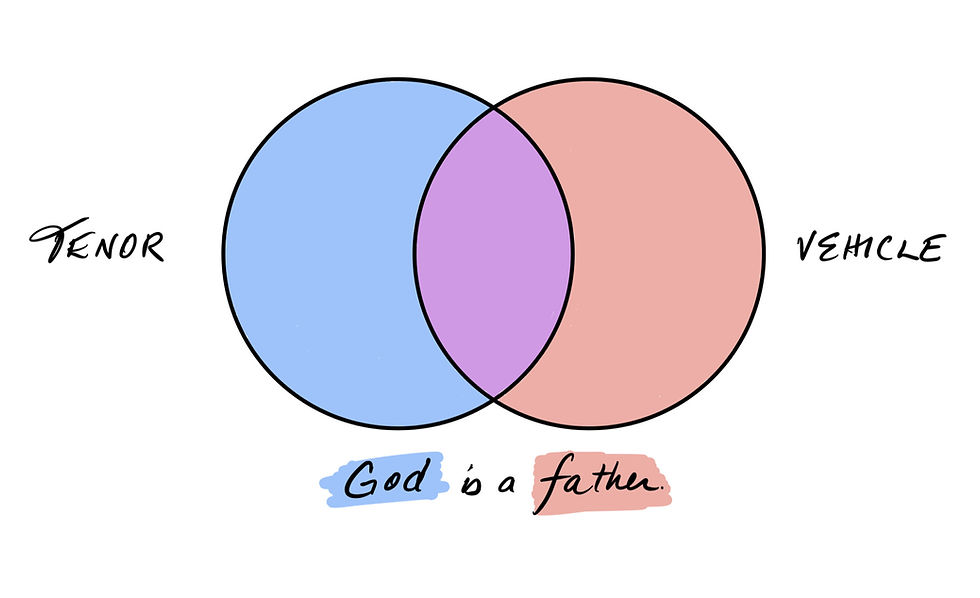When Earth Makes Sense of Heaven
- @Stage&Story

- Dec 25, 2020
- 7 min read
Updated: Jan 5, 2021

On my desk, I have a picture of my father and grandfather. We’re in Israel posing on a bridge in front of the Jordan River. I was 16 in the picture and since then my grandfather has passed away and is now with the Lord.
I’ve written much about my grandfather and the way he’s cultivated my Christian imagination. But today, I’d like to reflect on my father, for, among many things, he's helped me better understand my Heavenly Father. My reflection will take us to a number of different places but we'll start with an inspired analogy.
AN INSPIRED ANALOGY
The analogy comes from Matthew chapter 7 when Jesus is speaking to his disciples. For the sake of clarity, I’ve split the passage into two parts. Consider what Jesus says,
Ask, and it will be given to you; seek, and you will find; knock, and it will be opened to you. For everyone who asks receives, and the one who seeks finds, and to the one who knocks it will be opened.
Or which one of you, if his son asks him for bread, will give him a stone? Or if he asks for a fish, will give him a serpent? If you then, who are evil, know how to give good gifts to your children, how much more will your Father who is in heaven give good things to those who ask him! (vs. 7-11).
Jesus’ point seems simple: disciples should ask God for what they need. He tells them to do it boldly (“ask,” “seek,” “knock”), and he confirms that God will answer them (“it will be opened”).
But Jesus doesn’t stop there, he offers an analogy to complete his argument. Even a human father gives his child what he needs, why wouldn't the Heavenly Father do the same?
The details of the illustration are pretty funny. . . and dark. Here’s how I imagine it in a contemporary setting. A hungry little boy runs inside the house. . . famished from playing ball with the neighbors. The moment he crosses the threshold he sees his dad in the kitchen eating some bread! Perfect timing.
BOY: Dad, I’m starving! Can I have some?
DAD: Sure, here’s a rock. Chew on that.
BOY: Uh…
DAD: Just kidding. . . How about a viper?
It’s pretty ludicrous, but that’s what Jesus is getting at. It’s natural for a father to give his child what he needs, especially when he asks. And if an imperfect and sinful (Jesus’ word is “evil”) father would do this for his son, how much more would a perfect and loving Heavenly Father do the same for his child? This analogy can also be called an argument of degree.
Analogy is a powerful tool of human communication. It attempts to illustrate and persuade through metaphor, a figure of speech that I'd like to dig into for a little while.
METAPHOR & ANALOGY VISUALIZED

English critic, I.A. Richards, spoke of the two parts of a metaphor: the tenor and vehicle. As I've illustrated above, the tenor is the idea that is being communicated and the vehicle is what it is being compared to. The overlapping area, as seen in purple, is the common ground, which focuses our attention on the main point of the metaphor.
Another way to think of it is to say that the purple area represents all the areas God is like a father. For example, God has a Son, but he also has spiritual children, and he cares and provides for them. The red indicates the areas where God is not like a father. For example, God does not have a wife, nor did he bring about his children through normal biological means.
When evaluating metaphors or analogies, we don't speak of them as true or false, but strong or weak. Thus, (as seen in the diagram below) the more overlap in the circles the stronger the metaphor is, and, theoretically, the more effective the analogy will be.

Let's return to Jesus' metaphor in Matthew 7 in which he says that we can compare the Heavenly Father to an earthly father. I've turned the Venn Diagram up on its end to help us visualize that Heavenly Father is the spiritual reality Jesus wants us to better understand through the earthly reality of a human father.

A GLIMPSE INTO THE HEAVENLY FATHER
Why would Jesus even need to delve into this analogy? His encouragement was straightforward: go ask God for what you need.
The answer seems to be that the analogy clarifies and unpacks the character of God. A trivial understanding of who God is will hinder us from seeking him.
For example, we all know that when times are difficult, it's easy to go looking for what we need in earthly places by earthly solutions. The enemy would love for us to question God's kindness or love in these times. We cannot see God the Father with our eyes or touch him with our hands, for He is spirit (John 4:24). And this means that sometimes God feels like a cloud of "frowning providence," mysterious and dark (William Cowper).
But what we do know, and can see and touch, are our earthly fathers.
Recently, in a season of difficulty, I turned to Jesus' analogy in Matthew and found great comfort in it. I followed Jesus’ words to understand my Heavenly Father by considering my earthly one. This wasn't hard for me, because while my father has never been perfect, he's always been present. In other words, I have many images, experiences, and stories to draw from when Jesus pointed me to think of my own father.
I remember my dad taking me to the park, playing ball with me in the cul-de-sac , camping with me on the beach, driving across the country next to me on a moped, bringing me to the movies, eating with me at the dinner table, sharing stories with me at bedtime, and--yes--disciplining me when I needed it.
I don't mean to be overly sentimental, but I know what his smile would look like if I were to knock on his door and surprise him with a visit. I know what he’d say if I were sick and needed something he could give. And I definitely know what he’d do if I came to him as a young boy and asked him for food.
So, what's my point? Because I know the heart of my earthly father, I get a glimpse into the heart of my Heavenly one. And what encouragement there is in Jesus' words, "how much more. . ." If an imperfect father would give his child what he needs, be confident that your perfect Heavenly would as well. . . and more!
A MULTITUDE OF METAPHORS
Now, I realize that some of you don't have fathers like mine, and the metaphor may not strike you the way it has stuck me. Perhaps to say that God is like a father doesn't clarify his character for you but, perhaps, taints it.
The good news is that Scripture offers more than one earthly reality to make sense of our Heavenly God. There are a multitude.
However, I do need to emphasize that referring to God as Father is more than simply a metaphor. It's a reality that speaks to the eternal relationship between the Father and the Son. God reveals himself in other images (as we'll soon see), but by saying God is Father, the biblical authors are saying something more.
D. Blair Smith in Tabletalk describes it this way,
"Scripture gives us a number of similes and metaphors for thinking about God’s qualities, but we must recognize that it clearly and directly speaks of God as Father. What is more, Scripture reveals this is a personal name.
A name is more than a metaphor. It is something we use to identify and establish intimacy in direct address."
Because Father is God's name it is different than other images or metaphors used to describe him. If you're interested in learning more about these distinctives, see Dr. Smith's article, "God the Father: A Name is More than a Metaphor."
With that said, for those of you who struggle with the idea of a loving father, God offers other pictures that unpack his character. My prayer is that as you meditate on these other images of God, the Spirit will help re-frame your experience (and understanding) with fatherhood, allowing God the Father to be the one who defines what a father should be.
Continuing on, let's consider one of my favorites metaphors used to describe God, as seen in Psalm 23 where David likens God to a shepherd.
"The LORD is my shepherd; I shall not want.
He makes me lie down in green pastures.
He leads me beside still waters.
He restores my soul.
He leads me in paths of righteousness
for his name’s sake."
By studying the role of the shepherd and the great attention he gives to his sheep, we expand the metaphor and come to a better understanding of God's character. Though we're dumb and defenseless, our Shepherd protects us from beasts, leads us to pastures, and provides for our needs so we can say, "I shall not want."
But there are many other metaphors that clarify God's character for us. He is a strong tower (Prv. 18:10) and refuge (Ps. 46:1) and rock (Ps.78:35). He is a gardener (John 15:1) and a physician (Ps. 103:3). He's a lion (Rev. 5) and a lamb (John 1:29).
As you may have noticed, the final two metaphors don't speak of God the Father, but God the Son. And that is where any discussion of knowing God's character should lead us. For the greatest image of God, the perfect embodiment of his nature, is found in Jesus (Col. 1:15).
SHADOWS AND SUBSTANCE
This leads us to the Incarnation: the act in which the heavenly took on the earthly. This is more than wordplay or a figure of speech; this is the perfect merging of tenor and vehicle; this is God redeeming man by becoming the God-man.
At Christmas, we celebrate this astounding miracle: when God the Father sent God the Son.
So, while Jesus points us to our earthly father to understand our Heavenly one, and the biblical authors points us to earthly things to wrap our minds around spiritual things, we must realize these earthly things are but shadows. The author of Hebrews reminds us of a similar idea when he speaks of the tabernacle system. "They serve a copy and shadow of the heavenly things," he says (9:5).
Earthly things can be beautiful and cherished, things to be embraced and enjoyed, no doubt, but their purpose is to point us beyond. For what's a shadow without its substance?
This time of year the sun sleeps earlier and the shadows dance longer, so I'm asking, seeking, and knocking that you'll glimpse the shadows but cling to the substance.
Merry Christmas and a Christ-centered New Year!
I dedicate this reflection to my father: thank you for pointing me to the Heavenly Father, so I might cling to his Son.

Dane Bundy is president of Stage & Story and principal of the secondary school at Providence Academy, a classical Christian school in Johnson City, TN.











Comments